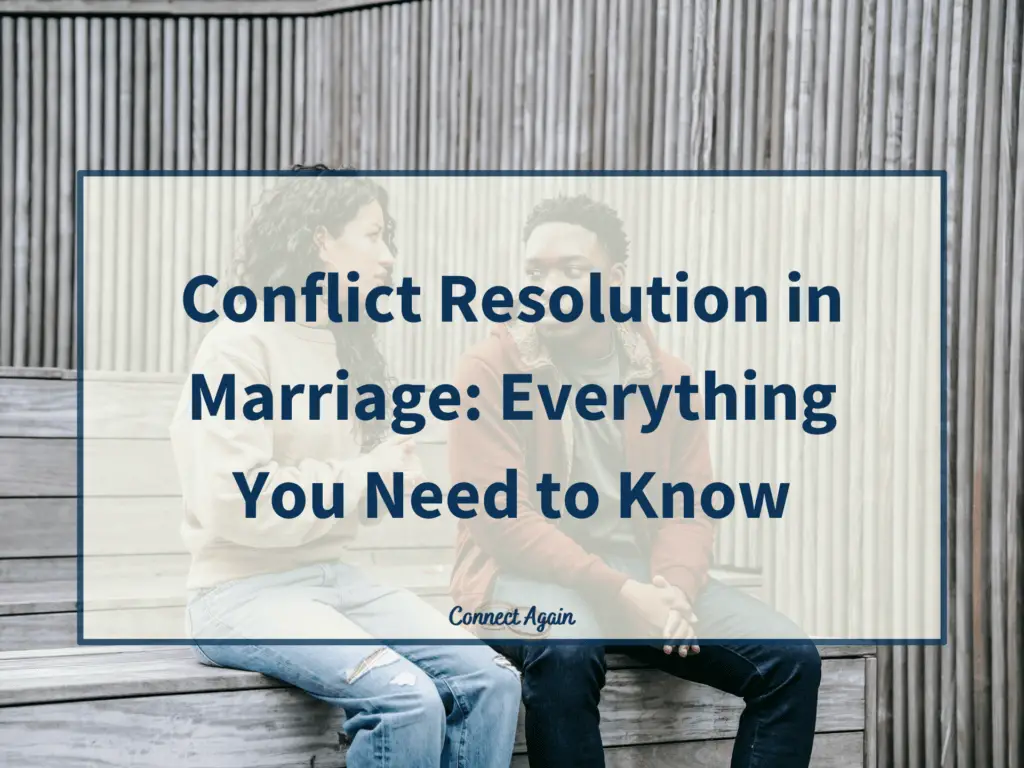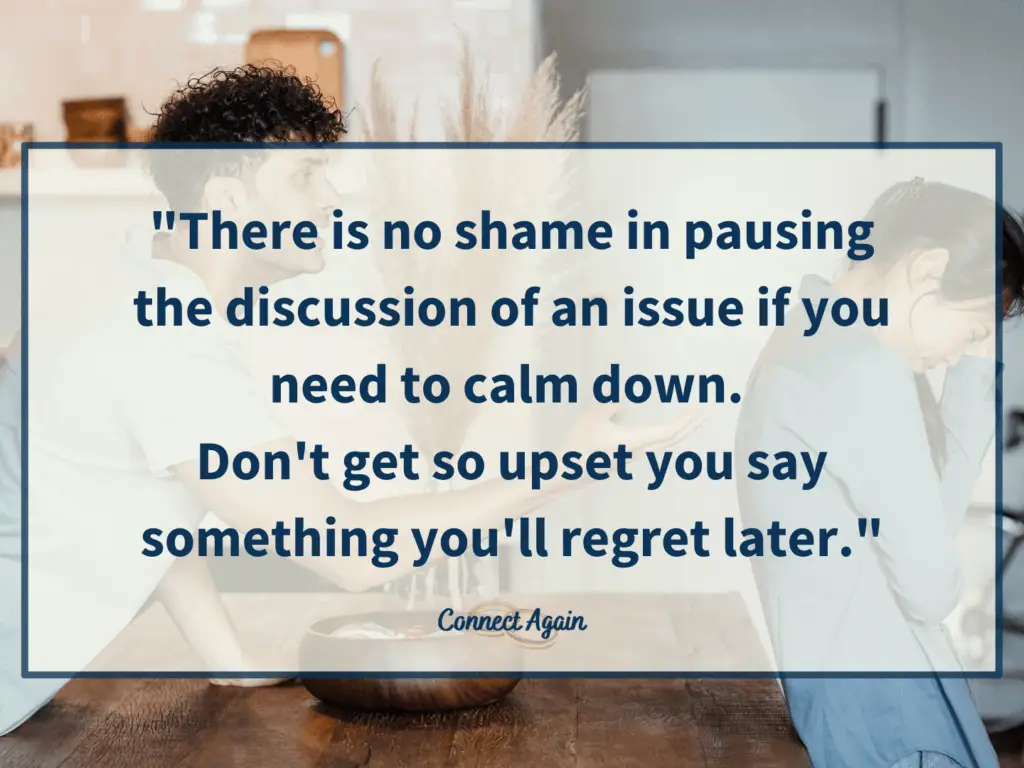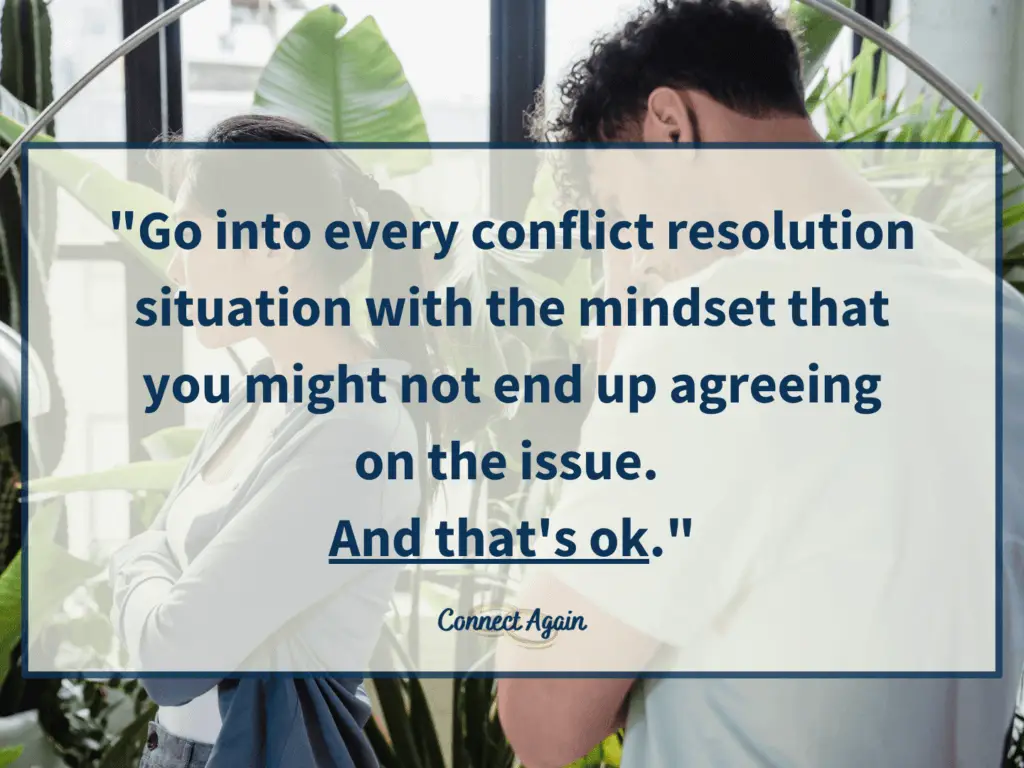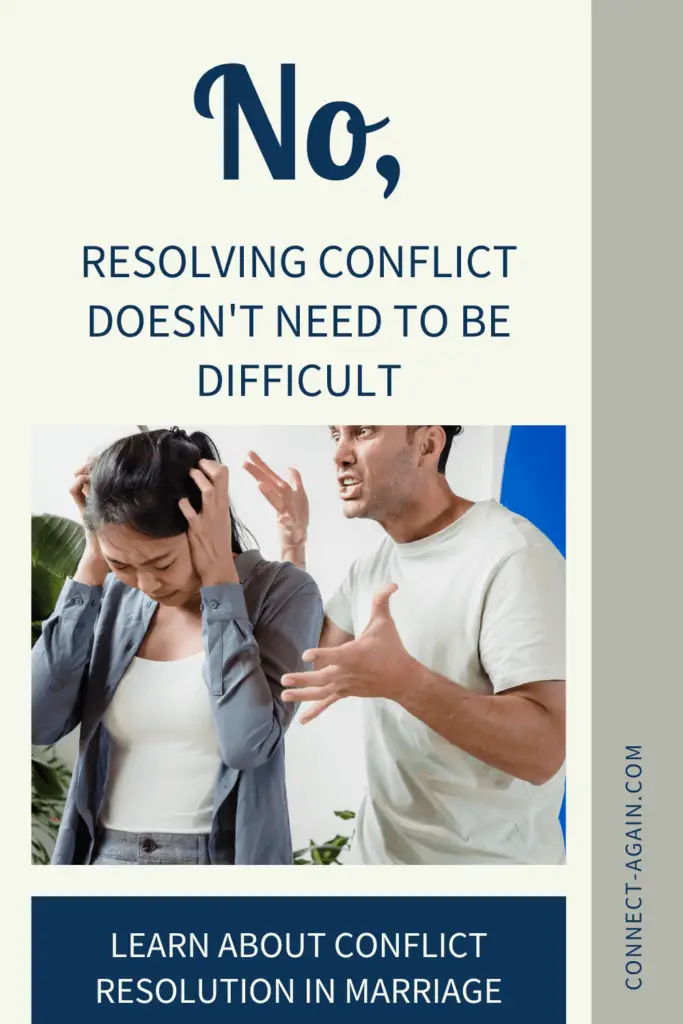Are you tired of constant arguments and unresolved issues in your marriage? This guide will equip you with the essential tools and techniques for successful conflict resolution in marriage.

After 11 years together (and 7 of them married), Josh and I have learned a lot about how to handle conflict. We’ve had our fair share of struggles. But we’ve never let it hurt our fundamental truth: that we love each other.
Instead, we’ve used our truth to learn from each mistake. We’ve grown so much in the last decade, both individually and as a couple. The following post contains all of the knowledge we’ve put to good use over the years.
However, since this post is such an important topic, I did research on it too. I wanted to give my readers every possible side to conflict resolution that I could find. My hope is that you end this post with a few strategies to implement in your marriage.
- What is conflict in marriage?
- Types of marital conflict
- Forgiveness and conflict resolution in marriage
- Causes of conflict in marriage
- 24 Guidelines for resolving conflicts in marriage
- 5 Steps in resolving interpersonal conflict between husband and wife
- 7 Biblical ways to resolve conflict in marriage
- Turn to prayer
- Conflict resolution in marriage
What is conflict in marriage?
Conflict in marriage is an issue between spouses. It can be as small as a difference of options or as big as a full blown argument. And everything in between.
Is conflict in marriage a bad thing?
It’s healthy to have conflict in your marriage. Disagreements can open opportunities to learn more about each other.
What matters is how you handle the conflict. It can help your marriage grow if handled with love and patience. But it can be damaging if handled incorrectly.
The good news is that it’s never too late to make changes! Keep reading for essential tips on conflict resolution in marriage.
Types of marital conflict
Marriages are complicated. So much can happen between spouses. That’s why I wanted to begin with the different types of marital conflict. It’s important to understand what kind of conflict you are having so that you can address it better.
Here are some examples of conflict in marriage:
- A difference of opinions
- A disagreement on something
- A disagreement on something that happened in the past
- Holding onto past grievances (that inevitably come back up in future conflicts)
- A lack of trust
- A lack of emotional intimacy
- A lack of respect
- One spouse continuously puts their own needs ahead of their partner’s
- Growing apart
- Fear of the unknown
- One (or both) spouses have a damaging past that affects them in the present
- Infidelity (in both thoughts and actions)
- Recurring arguments (this type of conflict arises again and again)

Forgiveness and conflict resolution in marriage
Before we get into specific strategies for conflict resolution in marriage, let’s first discuss forgiveness.
Are you having trouble forgiving your spouse for something? Why? What will it take to forgive them? Do you need to let go of your pride?
Forgiveness and conflict resolution in marriage go hand in hand. You won’t be able to truly resolve conflict in your marriage if you’re not willing to forgive your spouse.
Think of it this way: if you were to make the same mistake your spouse did, wouldn’t you want to be forgiven?
You also need to forgive yourself. This can be just as hard. I’m very tough on myself and find it hard to get past my mistakes. But forgiveness is meant for you as well as your spouse.
Causes of conflict in marriage
- A lack of communication (learn more about it here)
- A lack of emotional intimacy (learn more about it here)
- A disagreement on parenting (learn more about it here and here)
- An unwillingness to let go of the past
- A lack of trust
- A lack of respect
- Past conflicts (when conflicts go unresolved, they can be the underlying cause of future conflict)
24 Guidelines for resolving conflicts in marriage
For conflict resolution in marriage to be successful, you need to follow certain guidelines. Sit down with your spouse and choose from any (or all) of the guidelines below.
Stick to these guidelines because they will help set you up for success.
1. Take some time before discussing an issue to think
What is the issue? Before discussing it with your spouse, take some time to truly think about it. It’ll help prepare you for a discussion on the issue.
If you’re having trouble figuring out why you are so upset, ask yourself these questions:
- What happened right before I got upset?
- Does this issue bring up other feelings (resentment, abandonment, fear, etc)?
- Does the issue bring up past grievances from our relationship?
- Have I not truly forgiven or gotten over these past grievances?
- Does the issue bring up bad memories from my past?
2. Begin conflict resolution when you are calm
Big emotions tend to cloud our judgments. If you begin discussing an issue before you have calmed down (even just a bit), you could escalate things further.
3. Step away if things get heated
Even if you are able to start a discussion calmly, it doesn’t mean it will continue. Your emotions could get the better of you when you’re in the moment. If either of you begins to get too upset, step away.
There is no shame in pausing the discussion of an issue if you need to calm down. You wouldn’t want to get so upset that you say something you’ll regret later.
4. Do not interrupt each other
Make a promise to each other that you won’t interrupt. It can raise tensions if you do. Plus, if you interrupt your spouse, are you truly listening to them in the first place?
That brings me to the next guideline…

5. Actively listen to each other
There’s a difference between listening to what your spouse is saying and actually giving them your full attention.
VeryWellMind says that active listening goes “beyond simply hearing the words that another person speaks but also seeking to understand the meaning and intent behind them.” Here are some ways to actively listen:
- Don’t think about something else when your spouse is speaking
- Look your spouse in the eyes
- Ask follow up questions
- Clarify any points you don’t understand
- Reiterate what your spouse just said to make sure you didn’t miss anything
- Don’t judge
Related Post: To the Husbands Who Travel for Work: How to Connect with Your Wives
Actively listening is very important to conflict resolution in marriage. If you are not ready to give your spouse your full attention, maybe you’re not ready to discuss the issue.
6. Accept that you will not always agree on everything
If you can’t agree on a resolution, don’t get upset with each other. That will only make things worse.
Go into every conflict resolution situation with the mindset that you might not end up agreeing on the issue. And that’s ok.
Having this mindset will help you move onto the “finding the common ground” phase of the issue.
7. Accept that you may not get “your way”
What you want may not be what’s best for the situation. Or for your marriage. So put your pride away and be ok with the fact that things might not go your way.
8. Do not “punish” your spouse with the silent treatment
You might need to step away from the discussion of an issue. Or you might need time to reflect. But don’t give your spouse the silent treatment.
Be honest and tell your spouse you need time to calm down or think. Tell them that it will help you have a better conversation with them.
Hopefully your spouse will understand because you take the time to not give the silent treatment. Instead, you explain why you are stepping away.
9. Be honest
Things are never going to get better if you’re not honest. This includes being honest with yourself too.
That’s just one of the reasons why having time to reflect on the issue is so important. You need to make sure you are understanding your feelings.
10. See conflict as an opportunity for growth
When we go through a challenge, we can learn from it and grow. Stay positive and use your struggles to strengthen your marriage.

11. Apologize
Accept the part you played in the conflict. Don’t let your pride get in the way of coming to a resolution. It can be hard to admit your mistakes but your spouse will appreciate it when you do!
12. Reflect on your regrets
We all have regrets. I want you to think back to any regrets you have about past conflicts. Was there a time when you didn’t handle something well? Or maybe there’s a pattern in your past conflict resolution that you regret.
Whatever it is, reflect on it. Grow. Do better this next time. Once we recognize areas where we need to grow, we can begin to move forward.
13. Set realistic expectations
Is this a really big issue? Are you going to solve it in one sit down?
Don’t pressure yourselves too much by expecting unattainable goals. Likewise, don’t expect everything to change right away. True change takes time.
14. Choose to see the good
You married a good person. See the good in them. See the good in your marriage. Focus on the good when all else fails.
15. Give your spouse the benefit of the doubt
This guideline is similar to seeing the good. Give your spouse the benefit of the doubt. Do you really think your spouse meant to hurt you with what they said? Or could it have been a misunderstanding?
By starting with the benefit of the doubt, you allow your spouse room to explain their part.
16. Don’t EVER mention divorce
You made a commitment to your spouse. Stick to it. Show your spouse that you are serious about strengthening your marriage by never bringing up divorce.
Remember that all couples fight. Don’t let that get you down. Don’t even let the word divorce enter your mind.
17. Accept the flaws
Accept that you and your spouse both have flaws. You can both resolve to work on them. But don’t let these flaws burden your attempt to resolve conflict.
18. Be present
Don’t let your mind wander. Don’t think about how this current issue affects the future. Or what could happen if this issue goes unresolved.
Allow yourself the gift of being in the moment.

19. Don’t bring up past grievances
Don’t lump past grievances into this conflict. If the current issue is a reoccurring one, remember not to make your spouse feel bad about it. We all make the same mistakes over and over. Even if we’re trying to be better, we still falter.
As mentioned above, reflect on the current issue before talking to your spouse. If a past conflict comes to mind (because they’re related somehow) try the following ideas:
- Express that there are deeper issues you’d like to discuss other than the current issue. This will help set the expectation for the conversation
- Stick to the current issue and work on resolving it. At the end, mention that you’d like to talk about a past issue as well. It’s ok if your spouse wants to table that discussion. They might be emotionally exhausted by that point.
20. Use “I feel” statements
This is a common conflict resolution technique. Learn more about it here.
Related Post: How to Appreciate Your Husband – 8 Simple and Effective Ways
21. Do not attack each other
Stick to the issue and don’t place blame or hurt your spouse. Try to have a frank conversation about the issue.
22. Set boundaries
Some memories or topics are too painful to bring up when discussing a separate conflict. Make sure you both know your personal boundaries and share them with your spouse. Agree to stay away from them during conflict resolution.
23. Turn to your faith
Whatever you believe, turn to it. Ask for help.
If mindfulness really calms you, meditate before discussing an issue with your spouse.
24. You don’t have to act on your feelings
This is an area that is really difficult to master. Just because you are upset, doesn’t mean you have to act on those feelings. You can stay calm.
Especially in the heat of the moment, it’s really easy to act on our feelings. Just keep this handy guideline as a helpful reminder that you do have control over your actions.

5 Steps in resolving interpersonal conflict between husband and wife
The following 5 steps will help you resolve conflict in your marriage. Make sure you keep in mind the guidelines mentioned above.
Helpful conflict resolution strategies for couples
Step 1: Begin by saying something nice to each other
This can be anything. You can thank your spouse for something. You can compliment them on a nice character trait.
This can be simple or elaborate. Just say what comes to you.
Why should you start conflict resolution by saying something nice to each other? Because it immediately sets the tone. It reminds you of how much you love each other. It can help cool down hurt or angry feelings. There are so many benefits to beginning the discussion of an issue this way.
Step 2: Hear each other out
You both need to share your side of the issue. Each of you needs to actively listen to each other. There are always two sides of an issue and both of you need to say your part.
Hearing each other out comes with an added benefit: you feel like you matter. When you truly listen to what your spouse has to say about an issue you listen to their feelings. You are effectively telling them that what they say matters.
Hearing what your spouse thinks or feels about a conflict in your marriage might give you a new perspective. It can be so easy to get stuck in our own heads, thoughts, feelings, wants, etc.
But once you really listen to your spouse’s side, you might be able to shed some new light on the matter. If not, then keep going to Step 3.
Step 3: Get to the root of the issue
Ask each other follow up questions and work together to figure out what’s really going on. Hopefully you’ve already done some reflection before discussing the issue with your spouse. But if you haven’t, ask your spouse for help.
A lot of times we can get upset about something completely different. For example, maybe your spouse forgot to get the cereal you like at the grocery store. And this upset you. Are you really mad about the cereal? Or do you feel like your spouse doesn’t consider your wants enough?
Seemingly simple arguments can stem from much deeper emotions. Figure this out together to truly move forward.
Step 4: Come up with solutions to the problem TOGETHER
Work together to solve the problem. Each of you should propose some solutions.
Let’s say the root of your latest issue is stress. You have both been stressed and became crabby with each other. You lashed out and were short with each other. Here are some possible solutions that you could discuss:
- We will each work on managing our stress
- We will be open about our stress with each other (so it doesn’t come out of left field)
- We will give each other breaks from the kids to decompress and breathe
It’s helpful when you both propose solutions so that you both feel like your opinions are heard.

Step 5: Learn, make a plan, and move forward
First of all, learn from this issue. What could you do differently next time? What did you do well? Share these thoughts with your spouse.
Next, make a plan. This requires 2 steps:
- Decide on a solution to your problem. You both need to agree on this.
- Use what you learned from this conflict resolution (i.e., how did you handle this conflict, should you have done something differently?). Decide together on how you will handle this conflict (or conflict in general) in the future.
And lastly, move forward. Use conflict to strengthen your marriage. Change comes from getting over challenges. So get over this challenge together and grow.
One last note on moving forward: apologize and forgive each other. Forgiveness is healing for the soul and your marriage.
7 Biblical ways to resolve conflict in marriage
Connect Again is not a religious blog, even though I myself am religious. I wanted to welcome all couples of different beliefs. In the end, aren’t we all going through the same things?
Apart from bringing in my own experiences to each blog post, I do extensive research too. Sometimes I see that people have been searching for spiritual solutions to issues. So I occasionally do include Biblical strategies and prayers in my blog posts. Even if you’re not religious, I encourage you to read this section. It contains good moral strategies for resolving conflict in your marriage.
1 Corinthians 13:4-7
I have to start with this iconic 1 Corinthians passage:
"Love is patient, love is kind and is not jealous; love does not brag and is not arrogant, does not act unbecomingly; it does not seek its own, is not provoked, does not take into account a wrong suffered, does not rejoice in unrighteousness, but rejoices with the truth"
This Bible verse can help you form a solid foundation for conflict resolution in your marriage. Remember that you love each other. If you need a reminder of what love is, go back to this Bible verse.
This verse describes a perfect form of love. We are human and naturally falter. Instead of getting demoralized for not loving your spouse perfectly, use it as an opportunity to grow.
Take a deep breath and pray on this beautiful Bible verse. In what ways have you strayed from loving your spouse perfectly? How can you work on this with regard to conflict resolution in particular?
For example, do you constantly place blame on your spouse and remind them of the ways they have wronged you in the past?

James 1:19-20
"This you know, my beloved brethren. But everyone must be quick to hear, slow to speak and slow to anger; for the anger of man does not achieve the righteousness of God."
This beautifully simple verse from James is a good reminder that we should keep our anger in check. The verse also describes active listening perfectly:
Be “quick to hear” your spouse. Actively listen to them.
Be “slow to speak”. Give your spouse the opportunity to talk and share their feelings. Do not talk over them or interrupt them.
Related Post: 60 Awesome Date Night at Home Ideas for Married Couples
Proverbs 15:1
"A gentle answer turns away wrath, But a harsh word stirs up anger."
Again, this is a powerful verse from the Bible. How many times has your spouse been angry with you and you just got angry right back? What if you instead responded with kindness and love?
Your harsh words will only “stir up” your partner’s anger even more. Give it a try and see what happens when you respond to your spouse “gently” instead of “harshly”. You might just diffuse the tension and help your spouse to calm down.
You can’t control anyone but yourself. If your spouse is angry, the first thing you can do to help the situation is to keep your own anger from stirring up.
Ephesians 4:26
"Be angry, and yet do not sin; do not let the sun go down on your anger,"
It’s ok to be upset. It’s not ok to use that anger and hurt your spouse. We all say things we don’t mean when we’re upset. If you’re too angry to talk to your spouse, take some time to breathe and calm down a bit. Remember the guidelines from earlier in this post.
“Don’t go to bed angry.” You hear this advice a lot. Not everyone agrees with it. If you can’t resolve an issue before bed, I would suggest “pausing” your anger.
Instead, find a way to connect with each other in a simple way. Watch a quick 30 minute comedy show together. Or sit in bed and read together while holding hands. Do something simple that will help you feel close and loved.

Matthew 5:9
"Blessed are the peacemakers, for they shall be called sons of God."
Strive to be the peacemaker in your family. This is a nice short verse. Write it on a post-it note and stick it your bathroom mirror or bedside table. Keep it close to remind you of God’s expectations for you.
During a heated argument, take a deep breath and remind yourself that you CAN be a peacemaker. You can defuse the tension and bring joy and love back to the situation.
Having something to focus on will help.
Colossians 3:13
"bearing with one another, and forgiving each other, whoever has a complaint against anyone; just as the Lord forgave you, so also should you."
Forgive each other. It can be hard to do in certain situations. But remember that God wants you to forgive.
Turn to prayer
Turn to prayer. Ask God for the strength to act how He wants you to. Ask God for the strength to forgive.
Conflict resolution in marriage
Conflict resolution in marriage can get messy and tough. But stick to the advice in the blog post to help you and your spouse get through it successfully.
I’d love to hear what you think in the comments! Are there any strategies I missed? What has helped you and your spouse the most? What do you still need to work on?
Remember that no marriage is perfect and we all make mistakes. It’s what we do with those mistakes that define our marriage going forward.
Another essential way to resolve conflict in your marriage
A big part of resolving conflict with your spouse has to do with emotional intimacy. I’ve touched on quite a few of these points throughout the post. However, if you’re looking to focus on strengthening the emotional intimacy in your marriage, you’ll want to check this post out.
You’ll find practical and lasting ways to strengthen the emotional intimacy in your marriage. These are tips Josh and I personally do and stand by.
Pin for later!



I love this. A couple of those conflict resolution verses are extra special to me.
Excellent post with great tips in resolving conflicts in marriage. Thank you for sharing.
Pastor Natalie (Examine This Moment)
Letstakeamoment.com
Thank you so much! I’m so glad you enjoyed it 🙂
Great insight on resolving conflict within a marriage. About stepping away when upset, sometimes that can become a barrier to a resolution. I’ve heard of people who are always walking away because they are so upset and eventually nothing ever gets resolved. There has to be some form of boundary when walking away. How upset do you have to be to walk away? As along as the frontal brain is working, I say sit down and talk it out.
That’s a great point! I agree that setting boundaries would help with this. I would also add that there needs to be an agreement that both of you WILL come back to the conversation if one of you has to step away. Agreeing to this up front will help a lot.
Great guide with such amazing tools and techniques for marital conflict resolution. I think the tip to apologize is helpful. A genuine apology goes far in a conflict.
I couldn’t agree more! A genuine apology helps conflict resolution so much. It can definitely defuse a situation. Thanks for reading! 🙂
As someone who got married after 40, it takes extra work because both people are set in their ways. But it’s worth it in the long run.
That’s a such a great point! The later in life you get married, the harder some things can be. But yes, It’s definitely worth it to work through these things!
This is such an amazing, helpful and in-depth post! I think being able to resolve conflict in any relationship is so important! I think a lot of these tips are transferable to any relationship but is especially important with your spouse!
Absolutely! These tips can definitely be applied to other types of relationships. I’m so glad you enjoyed the post!
This post is amazing! It is full of so much important information that help anyone’s marriage!
Thank you so much! I’m really glad you found it to be helpful 🙂 Thanks for reading!
Great info! Lots of good points to consider when having conflicts!
I’m glad you thought the information was helpful! Thank you so much for reading 🙂
Great post! Thanks for sharing!
I’m so glad you liked it! Thanks for reading 🙂